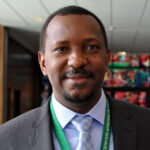There was a story told about a political rally where the politicians promised the people of a certain locality that, if voted into power, they would eradicate the mosquitoes that were responsible for the incidence of malaria in the place. To illustrate his point, the campaign team displayed posters showing the mosquitoes they were referring to.
But the people were not to be fooled; they knew their problems. So, to the politician’s surprise, the people replied that they did not have those types of mosquitoes displayed on the posters.
We are back to those days once again, as our politicians accompanied by their media strategists are busy painting for us pictures of an Eldorado they will soon unleash on us, once we give them our mandate come next month. Indeed, electioneering time has become the best time to live in Nigeria. At such a time, as we are experiencing now, we are jolted from our poverty-riddled psyches to glimpses of beauty that can be our lot here in Nigeria.
This blame is not only for the current politicians, some of whom may be somewhere close to where you are now, and listing the various things they will do for your community, your local government, and even your state. They are simply continuing the tradition that has kept Nigeria where it is right now.
- Ronaldo-Messi rivalry set for new chapter in Riyadh
- Senate blames finance minister, CBN gov for delay in reconsidering Buhari’s N22.7trn loan restructuring
This is the trouble with our politics, which has been captured by those who tell us they mean well for us, while in fact, they are on a different venture. If politics or political economy specifically is the art of managing resources for the good of all, then something has been wrong all along with the brand that has been practised in Nigeria so far. This brand of politics in Nigeria is one that focuses on the politicians rather than the people’s welfare.
Otherwise, how come it is that we only get to hear or know how great this country or part of it could be only when elections are around the corner? They reel to us the problems they will solve for us and how our lives, as Nigerians say, will never be the same again. They remind us that this land is blessed with all the resources that are needed to turn it into something similar to any of the beautiful countries where the elite often jet out to enjoy life.
Ordinary Nigerians have always wondered aloud why it is that Nigerian politicians, who have dominated the corridors of power, forget that the things they enjoy abroad can also be good to the masses at home. When they go to Dubai, London, New York, and other beautiful places on earth, why do they think that Nigerians at home are allergic to such good things, and therefore should not be made to enjoy them here? When they go to countries where electricity is available all day, why can’t they ask how those people achieved that, so we can replicate it here at home?
Nigerians are not allergic to travelling on good roads. So, why is it almost impossible for us to have good roads in Nigeria? Or, is it that we have not seen enough examples of good roads that we cannot build here? Or that the technology that supports the kind of infrastructure there can’t be imported here? Or, is it that the models for financing good roads, even within affordable budgets, do not exist?
Somehow, each election cycle in Nigeria is just like a new beginning. It is as if the country has just begun and so we have to talk about the rudimentary things, just like the politicians whose campaign was to eradicate mosquitoes in that community.
As Robert Heilbroner has said in his book, The Worldly Philosophers: “The secret to economic growth lay in the fact that each generation attacked Nature not only with its own energies and resources but with the heritage of equipment accumulated by its forebears.
“And as that heritage grew – as each generation added its quota of new knowledge, factories, tools, and techniques to the wealth of the past, human productivity increased with astonishing rapidity.”
But we do not seem to experience that creative addition cumulative buildup in the development of our economy. This explains why every four years, politicians dust their rusty strategy papers prepared for them by professional consultants and take over the airwaves in the name of political campaigns. That is because there is no continuity in the art of governance here. Each group, each dispensation comes with its own plan, which most of the time is totally different from what the nation needs.
Imagine that a certain fraction of campaign promises made to Nigerians has ever been faithfully implemented, whether in the health, or power, or energy sector, by any of the successive administrations. And that each administration added to what the previous ones built, and the next ones added their bit. What do you think would be the state of this economy today?
The tragedy of Nigeria today is this duality that marks our politics. While they are gleefully reeling from their sweet-sounding agendas or manifestos, there is actually an unwritten or unseen version that in fact is the one pencilled down for implementation.
This explains the fact that apart from one or two sectors, it is as if we are just starting all over in 2023. Take the power sector, for instance, where we are still shamefully struggling to produce enough electricity for Nigeria’s population. This is in spite of all the billions of dollars that have been sunk into that sector.
Why do we still have as many as 20 million out-of-school children in a country that says the youths are the hope for the future? What kind of future will out-of-school, under-the-bridge children create? By failing to prepare this large army of unlearned, unskilled children we are in effect preparing for the kind of country that they will create and dominate.
That is part of our reality. Let’s take a snapshot of today’s Nigeria. In four years, let’s compare and see what would have changed. When that time comes, let’s hope that those asking for our votes today would be proud to own the new realities.

 Join Daily Trust WhatsApp Community For Quick Access To News and Happenings Around You.
Join Daily Trust WhatsApp Community For Quick Access To News and Happenings Around You.


